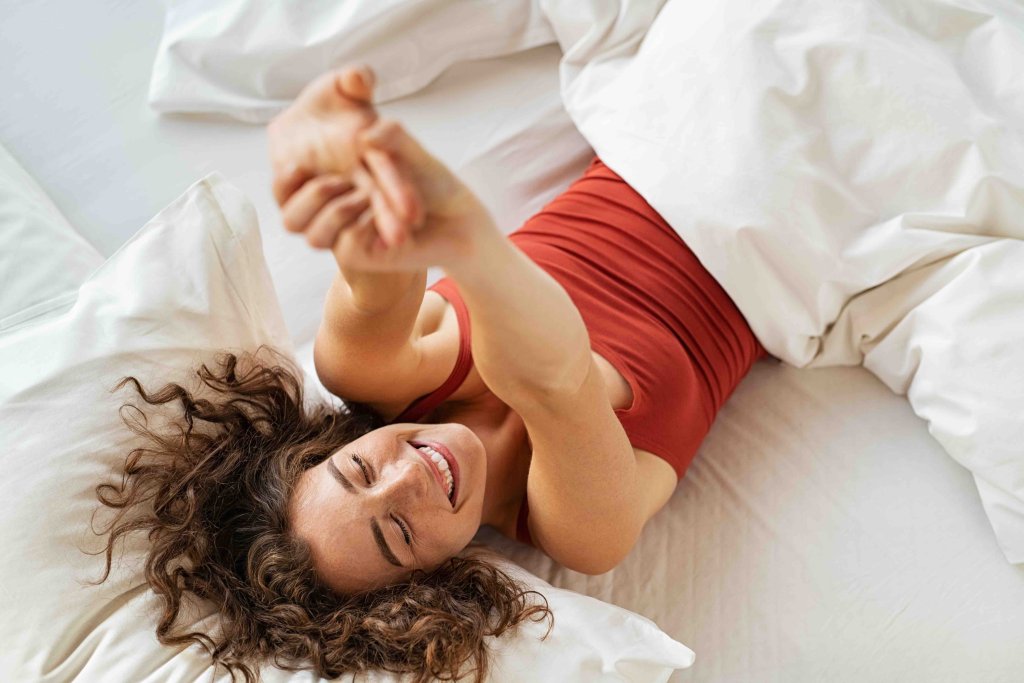One thing that almost everyone can get better at is improving their sleep health. Not just because we live in a hustle culture that prioritizes being on the go over taking care of our bodies, but because developing good sleep habits will impact every aspect of your health and wellness.
Whether you’re tossing and turning at night or getting drowsy during the day, you’re not alone in your sleepiness. Insomnia is the most widespread sleep disorder in the U.S., affecting almost two-thirds of adults. Sounds like many of us could do with a good night’s sleep! The question of why sleep is important for fitness is layered, so let’s dig in!
How much sleep do I need?
Most healthy adults need at least seven hours of sleep each night for proper cognitive and behavioral function. Those at younger ages, such as adolescents and kids, need even more.
Not enough “Zzzs” doesn’t only make you tired, but recent studies have found a significant correlation between poor sleep health and depression. When we don’t fulfill our body’s need for rest, we end up with chronic health issues such as heart disease, obesity, stroke, and depression, among other things. According to a poll by the National Sleep Foundation, 65% of participants who were dissatisfied with their sleep habits also experienced depressive symptoms, with 31% reporting moderate-to-severe symptoms. In short, sleep is very important.
What are the health benefits of sleep?
Good sleep habits not only prevent health issues, but they promote health benefits. Let’s take a closer look at how proper sleep can help impact your health and wellness for the better.
Sleep and building muscle
The relationship between sleep, physical activity, and building muscle is a closely connected one. After a good workout, you might find yourself feeling exhausted because of the extra effort and energy used during exercise. It’s critical that we listen to our bodies when we feel this way. Sleep is extra important in this scenario because your body has been breaking down muscle fibers to begin the process that creates new — and strengthens existing — muscle fibers. This process happens when you’re sleeping. So, when paired with physical activity, rest quite literally makes you stronger.
Plus, after a good night’s sleep, you’ll wake up rested and ready; that energy can be used to meet your fitness goals. More sleep means better recovery and increased productivity.
Sleep and your appetite
Did you know? Studies have shown that sleep deprivation leads to higher calorie consumption. When we don’t get enough sleep, our body’s ability to properly regulate food intake is affected. When the hours you sleep go down, ghrelin, often referred to as the “hunger hormone,” goes up. On top of that, leptin, the hormone that regulates energy and makes us feel full, goes down when we don’t get enough sleep. Combined, those two changes in hormone levels have a significant impact on your appetite.
To put it simply, individuals who get adequate sleep tend to see higher success in meeting caloric intake goals and maintaining their weight when compared to individuals who don’t. That means that if you’ve increased your physical activity as part of an effort to lose weight, you need to make sure to increase your sleep, too.
Sleep improves your immune system
Your body uses a lot of energy when you’re awake compared to when you’re at rest. When asleep, your body conserves that energy and distributes it to other functions of the body. From strengthening white blood cells to aiding in the body’s adaptation to new vaccines, sleep can improve a vast variety of immune responses.
Sleep helps your body repair, regenerate, and recover. These functions are crucial to supporting a strong and healthy immune system.
5 tips for developing good sleep habits
While we can’t always get a full night’s sleep, it is important to identify patterns and do what you can to get as much sleep as possible. It may be difficult or frustrating at first, but we believe in you! With healthy sleep habits, you’ll be in a better position to reach your fitness goals. Here are a few things you can control to help make the most out of your time hitting the pillow.
1. Sleep in a cool, dark room
Bright lights create a response in the brain that actually energizes the body — this effect is linked to our Circadian rhythm. Humans have only been measuring time for around 5,000 years, so our bodies came up with a Circadian rhythm as a way to keep track internally. Because of this, by getting more sunlight in your day and reducing blue-light intake at night, you may find it easier to fall asleep.
So why does your bedroom need to be dark and cool? When you sleep, your core body temperature drops, particularly during the stages of REM sleep. You become more sensitive to changes in temperature, which means that a consistently cool room is key for quality sleep. It’s recommended that you sleep in a room around 65 degrees Fahrenheit, but this number can fluctuate based on your personal comfort level.
2. Keep your routines consistent
Generally speaking, our bodies love schedules. When it comes to sleep, a consistent schedule can make falling asleep — and waking up — much easier. Regular exercise can also aid in the quality of your sleep, so make sure fitness is routine in your life. That’s just one more of the many benefits to exercising, and yet another reason to stay consistent!
3. Create a sleep space that’s both safe and comfortable
When it comes to mattress preference, everyone has their own specific preference — it’s a literal Goldilocks situation. As we mentioned about keeping your room cool, comfort is key when falling asleep and staying that way all night. If you’re being woken up by neck or back pain due to your mattress, it might be time to try something different. Is your bed too hard? Try adding a pillow topper. Too soft? A large wooden board between the mattress and box spring might do the trick.
It’s also important that you feel safe when you’re asleep, as being fearful or stressed can cause sleep deprivation. Close the curtains, turn on some relaxing music or a guided meditation, or try some melatonin to turn the anxiety down and the sleepiness up.
4. Avoid stimulants before bed
Stimulants, such as caffeine, are meant to keep you awake. If you consume them in the evening, it can make your mind race and keep you up well past your bedtime. If you drink a lot of coffee, try to limit caffeine consumption to the morning or turn to decaf once noon hits. We know it’s tough to cut back, but give it a shot; the improved sleep will far outweigh the cravings for an evening cup.
It’s also important to minimize blue light (think computer screens, your phone, TVs, and so on) during the couple of hours leading up to bedtime. The blue light signals to your brain that it is time to be awake, which makes feeling rested an uphill battle.
5. Relax with intention
Falling asleep isn’t a switch. It takes time for our bodies to slow down and prepare for rest. Aim to tackle your big tasks early in the day to allow for extended rest and relaxation in the evening. Going to sleep while stressed can have you wringing your hands in your bed, so try relaxing for 1–2 hours or doing breathing exercises before to improve sleep quality.
Is exercising in the evening bad for you?
You may have heard that one of the effects of exercise in the evening is poor sleep, however, an expert systematic review of recent studies has shown evidence to the contrary! Just make sure your physical activity levels drop about an hour before bedtime — this is particularly true for vigorous exercises! After an hour, your heart rate should be low enough to be all set for a good night’s sleep.
If you are exercising before bed, we recommend picking an activity that can calm your mood, like yoga, versus a high-intensity activity like running on the treadmill. If you struggle to find time for physical activity or can’t fit in as much exercise as you’d like during the day, know that night workouts are a sleep-safe way to reap the positive effects of exercise!
The value of a good night’s sleep clearly can’t be understated. Not only is it important for fitness goals, but it’s good for your mind and soul, too. Keep in mind that most people take between 10–20 minutes to fall asleep at night, so if you consistently have sleep issues or serious difficulty falling asleep, it may be worth talking to a doctor.
Sweet dreams!
Not only is good sleep key to reaching your fitness goals, but it might even be more important than exercise.



